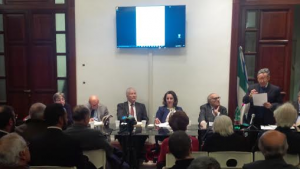FEATURES The Fascist Regime and Italian Jurists
During the Fascist regime in Italy, the directions of the Fascist party on racial discrimination were transformed into laws by a group of jurists who worked for the regime. In his new book Le leggi antiebraiche e razziali ed il ceto dei giuristi (The Italian Anti-Jewish and Racial Laws and the Class of the Jurists, published by Giuffrè) Giuseppe Acerbi tells the story of these controversial figures and their historic role. The book was presented in Rome at the Tullia Zevi Library and Archive of the Italian Union of Jewish Communities (UCEI).
Taking part in the event organized by UCEI Board Member Fabiana Di Porto (University of Salento) with the philanthropic organization Società Umanitaria, were UCEI president Renzo Gattegna, Gustavo Ghidini (Società Umanitaria), jurists Pietro Rescigno (University of Rome La Sapienza), Guido Alpa (University of Rome La Sapienza), Caterina Montagnani (University of Cassino), psychiatrist David Meghnagi (University of Roma Tre), and the author.
“Italian Jews were betrayed by their own fellow citizens. This book stands to remind us that the theory that says that Italians were good people, who did not really adhere to Fascism and its more extreme principles, especially compared to Germans, must be dismissed,” Gattegna stressed, condemning their action as did all the participants to the conference. “This – he added – is just a way of avoiding a self-examination.”
“Acerbi’s book is important, among for other reasons, because it recovers and saves for eternity an important page of our history in a language that is not too technical and therefore accessible to everyone,” Di Porto said. She said that everything began on December 13, 1939, when the names of Jewish professionals and academics were deleted from the register of lawyers.
“Unfortunately we have not yet come to terms with the supine attitude assumed by our class,” Ghidini said. “We must remember – his call on society – that hate and discrimination come as a danger for everyone sooner or later”, and that “our social conscience must be participatory and fully awake.” The reaction from the other lawyers to the exclusion of their Jewish colleagues, was rather weak, as Alpa confirmed.
The same indifference was shown towards those who participated in the writing of the racial laws. “Their names – Montagnani explained – were not defamed, and at the same time what is surprising is that those jurists did not think that accepting that infamy would affect their reputation, so some of them even helped some Jews.”
There was a “radical injury” to our tradition, according to Rescigno, and that is why “such a question lapsed into apathy or was hidden under justifications.” This is why it is necessary to learn from the past, Meghnagi warned, referring in particular to the exclusion of Israeli scholars in today’s academic world driven by the BDS movement. “When evil acquires respectability – he explained – there is no more shame, but rather protection.”

